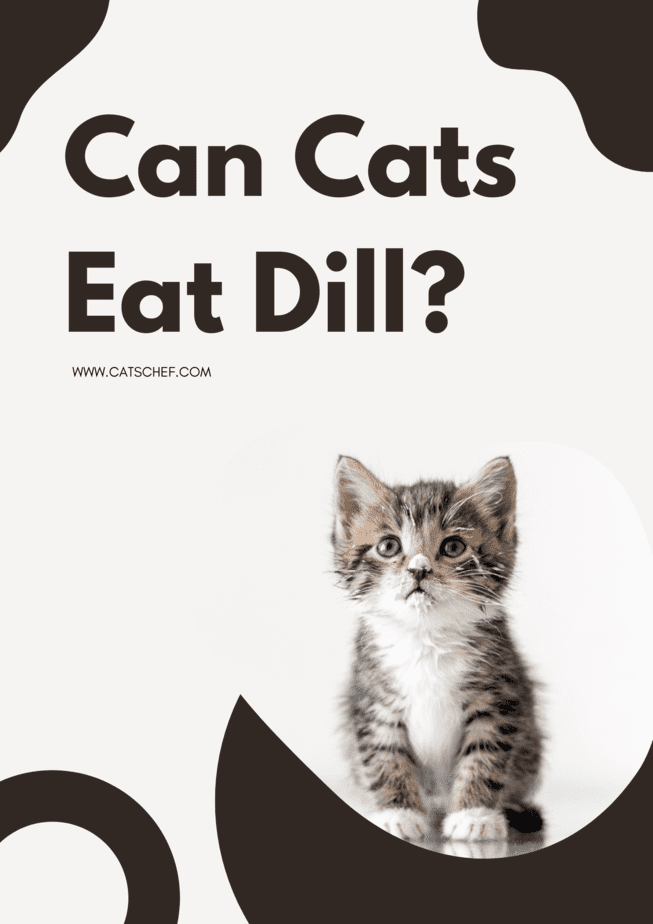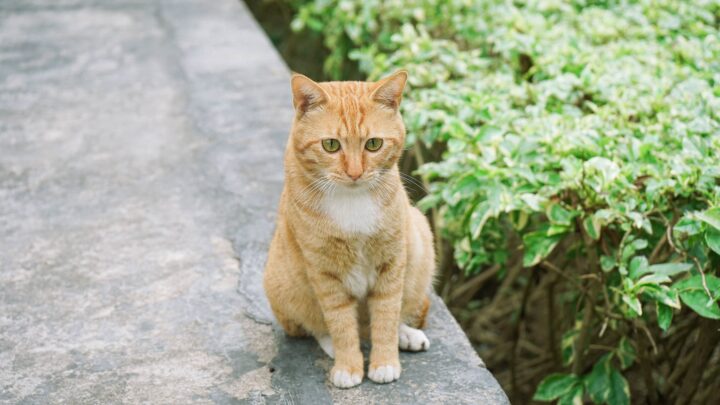You’re going about your day when you notice your curious creature perking up her ears and scrunching her nose. You’re alarmed but waiting to see what caught her attention this time. A butterfly? A fly without the butter? Maybe even a spider? “Wait a minute, can cats eat dill!?”
That’s right, your mischievous monster seems to have found something fun about a simple shrub of herbs. You’re not even surprised, given the proverbial curiosity that killed the cat, but you’re wondering what’s making her sniff her nose off when she’s presented with a herb bouquet.
You’re considering letting her enjoy a nibble or two, but you’re not completely sure it’s safe for her to munch on something that belongs in a jar of pickles!? Well, you’ve stumbled upon the RIGHT article because we’re here to give you the answers you (and your curious companion!) desperately need.
Our friends over at the ASPCA (American Society for the Prevention of Cruelty to Animals) don’t seem to have anything against feeding dill to your cat. Don’t get me wrong, some herbs can cause harm to your cat, but dill doesn’t seem to be one of them.
That’s right, cats can eat dill! But, before the two of you put your celebratory hats on and head to your local farmer’s market, you might want to throw a glance at some of the most important things about this tasty herb. Let’s start from the beginning, why don’t we?
What’s the deal with dill?
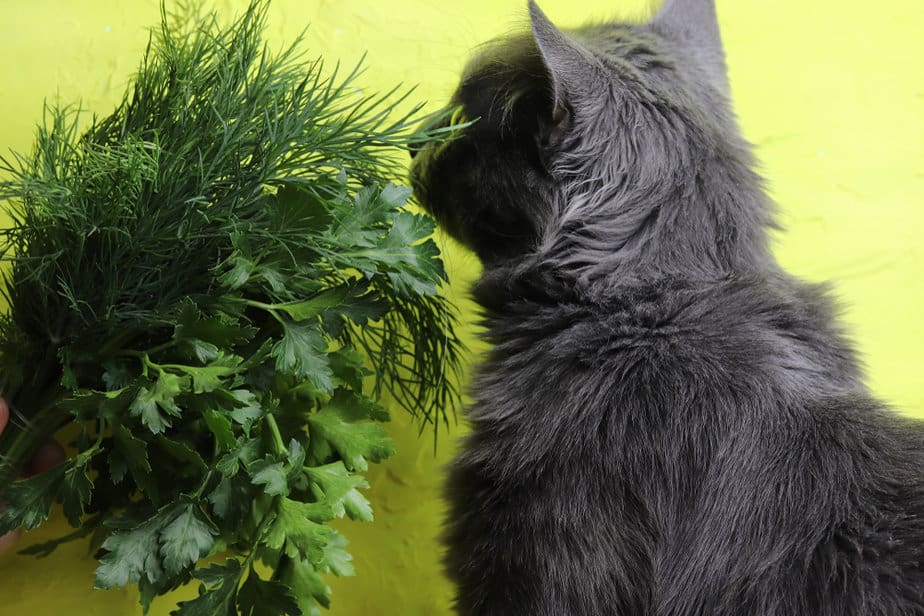
Let’s be honest here – the moment you read the word “dill,” you think of mouth-watering pickles and finger-licking (or should we say “paw-licking”) salads. But you might be pondering a thing or two about this tasty herb, considering your boisterous beast’s about to munch on some.
So, what’s the deal with dill? Well, dill’s a pretty big deal among herbs because of its various uses among humans. Dill originated from Europe and Asia but has been used among humans around the world for centuries.
What makes dill so much better than many other herbs is the fact that it can be used fresh, dried, or even powdered. You can sprinkle some fresh dill leaves on your potato salad, throw a pinch of dried dill leaves on your tzatziki sauce, or add a generous amount of powdered dill seed to spice up your soup.
And let’s not forget about the fact that dill’s brimming with nutrients that can boost your immune system and improve your health. That’s right – a spatter of dill can provide you with vitamin A, vitamin C, magnesium, manganese, and folate.
What’s the deal with dill and cats, though? Do cats even like dill?
Here’s the thing. Cats like everything they can get their paws on – because they’re cats. And, they seem to love dill because they enjoy the scent, the shrubbiness, and the fact you’re screaming at them to stop.
Can cats eat dill?
“She’s clearly going to munch on that herb whether she hears me or not, but can cats eat dill without getting seriously sick? Someone should stop her, but that someone can’t be me because she’s going to scratch the worried mother out of me the moment I try to get her away from it.”
With that (inner monologue you have every time your cat eats something she shouldn’t) out of the way, we can discuss what’s wrong (and right) about letting your cat nibble on a couple of dill leaves here and there. Dill’s great, but not a natural part of your cat’s diet.
You see, cats are carnivores. They need a bunch of meat, animal protein, and animal nutrients to survive and thrive. They don’t need fruits, veggies, and herbs the same way humans do. And they don’t even possess the enzymes necessary to break down and digest most foods humans eat on a regular basis.
What does that mean? While cats can eat dill, that doesn’t mean that they should. Wild cats aren’t likely to stumble upon dill and nibble on it while they’re considering chasing after their prey. Not-so-wild cats (like the one you have lying around) aren’t likely to eat dill, either.
Sure, dill’s packed with nutrients that can bring a couple of benefits to your cat’s table. But, we can’t forget about the fact that these nutrients aren’t necessarily what your cat needs. Consuming these nutrients rather than anything else can cause digestive problems, malnourishment, and anorexia.
What’s the point, then? Always consult with your vet before adding anything new to your cat’s diet and make sure to dust off your “catritionist” (cat nutritionist, obviously) diploma. Your cat’s better off munching on carefully crafted cat food and cat treats, anyway.
What’s good about dill?
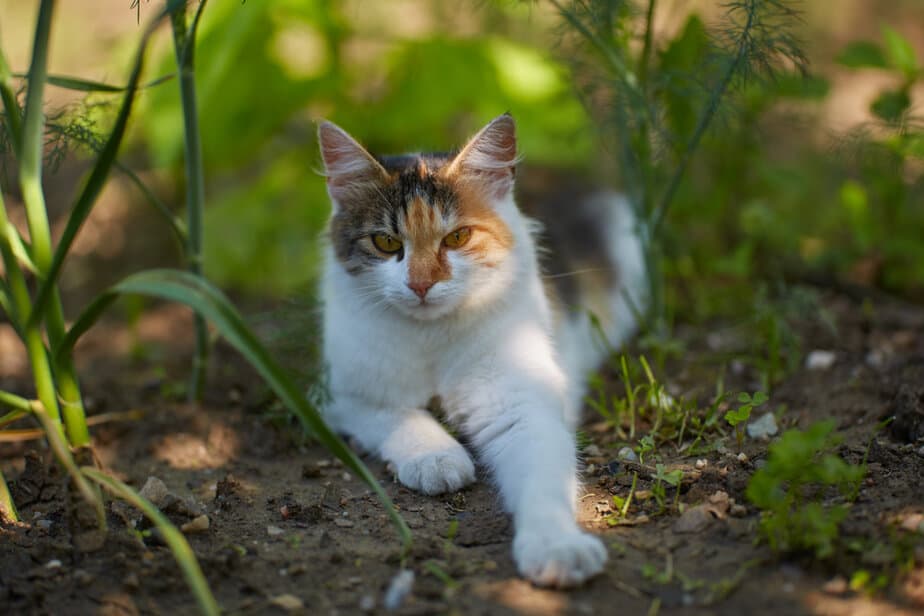
But, you might want to throw a glance at some of the benefits and drawbacks of feeding dill (and other herbs) to your precious pet. “Can cats reap the dill benefits the same way humans do? Can cats get an allergic reaction from nibbling on dill? Come on, we need answers!”
Here’s the thing. We already know that there are much better things for your precious purrincess to munch on when she’s looking for a pick-me-up. Cat food and cat treats can provide her with just the right nutrients she can actually use to her advantage, and an occasional meaty morsel is sure to make her whiskers spin in delight.
But, that’s not to say that the good old dill doesn’t have anything going on. Dill is packed with vitamins, minerals, and antioxidants that can boost your cat’s immune system, maintain the health of her nervous system, and ensure the proper function of her digestive system.
Trust me, dill has her systems covered with vitamin A, vitamin C, manganese, magnesium, and folate. Vitamin A, for instance, helps your cat battle against various diseases and protects her against numerous bacteria, parasites, and other pesky passengers.
Vitamin C helps boost your cat’s immune system and maintain her overall health. Manganese, magnesium, and folate help her deal with different digestive problems (such as constipation and diarrhea). And, we can’t forget about antioxidants such as terpenoids, flavonoids, and tannins.
Dill’s pretty great, don’t you think? But, before you start adding dill to EVERY. SINGLE. MEAL you ever serve to your cat, you might want to take a look at some of the dirt we managed to dig up, too.
What’s bad about dill?
Dill doesn’t seem to be as dandy as you might think! Cats can eat dill because they aren’t likely to experience severe reactions from a bite or two. But, who’s to say your furry friend will stop there!? Who’s to say she won’t fool around and scoff down the entire thing!?
You might want to have your vet’s number locked, loaded, and ready to go. But, you also might want to take a look at some of the things you can expect on the off chance that munching on herbs doesn’t go as planned. So, what’s bad about dill?
Firstly, consuming excessive amounts of dill can cause digestive problems. “Everything in moderation” seems to be the golden rule of feeding your feline friend anything she shouldn’t eat on a regular basis. She’s got a sensitive tummy that won’t appreciate anything that’s not 100% feline friendly.
So, you might expect to witness nausea, diarrhea, and vomiting if she ever crams down every single herb she could find in your herb garden. Contact your vet (for peace of mind), but don’t panic, because she’s likely going to feel better the moment her system gets rid of anything unwanted.
Secondly, your four-legged friend can experience an allergic reaction to dill. Cats can be allergic to herbs, and dill doesn’t seem to be an exception. That’s why it’s incredibly important to consult with your vet before making significant changes to your cat’s diet.
So, you might want to keep an eye out for symptoms such as sneezing, watery eyes, runny nose, coughing, difficulty breathing, wheezing, rashes, hives, and/or digestive problems. Symptoms defer depending on whether your cat sniffed or devoured a little bit of dill. Minus points for this herb!
What’s the deal with dill essential oil?
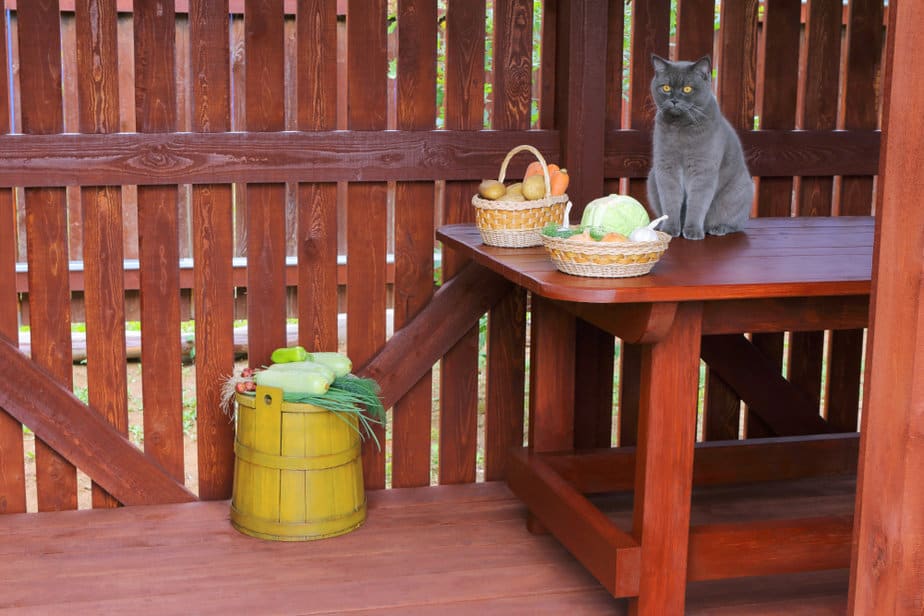
Repeat after me: “Cats can’t sniff, lick, eat, or do pretty much anything with dill essential oil!”
This might be the moment you start to question everything we’ve talked about so far, but bear with me. “Cats can eat dill but they can’t eat dill essential oil!? Why!?”
The relationship between cats and essential oils seems to be a complicated one. Your cat might look like she came straight from Coachella with her messy hair and a flower crown, but she’s not the biggest fan of the essential oil community.
Most essential oils are poisonous to cats and trust me, you don’t want to experiment to find out which ones aren’t. Some of the most common symptoms of essential oil poisoning are drooling, shaking, difficulty breathing, wheezing, weakness, lethargy, depression, unsteady paws, tremors, and seizures.
Can cats eat dill pickles?
Cats can’t eat dill pickles, but not because of the dill! Cat’s can’t eat pickles because they’re typically packed with salt, seasonings, vinegar (or some other acid), and preservatives. Some of these ingredients can give your cat a tummyache, but some of them are straight-up poisonous to felines.
Let’s start from the beginning. Salt is pretty safe for cats, but only when consumed in minute amounts. When your curious cat consumes too much salt, she’s at risk of sodium toxicity, which can cause vomiting, diarrhea, nausea, weakness, and other less desirable symptoms.
On the other hand, seasonings such as garlic powder, onion powder, and black pepper are detrimental to your cat’s health. Our friends over at the ASPCA urge pet parents to be extremely careful when feeding human foods to cats because of these seasonings.
Vinegar is pretty potent, but that prevents your cat from licking enough vinegar that can cause her harm. Preservatives, on the other hand, don’t have the same safety feature. They’re typically hidden within the food, which sounds even more ominous once you’re aware that they can make your cat super sick.
Can cats eat other herbs?
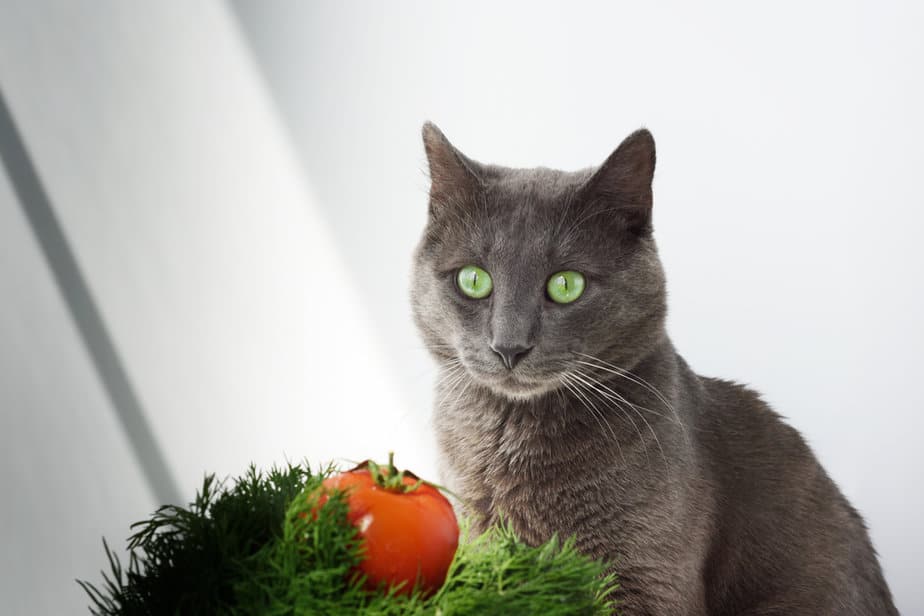
Yes, cats can eat other herbs! On the off chance that your cat’s intrigued by green cuisine, she might get a kick out of rummaging through your herb garden. She’s free to do so, as long as you’ve done your part and gotten rid of herbs that can cause her harm.
These are some of the herbs that are safe to stay:
-Basil
-Coriander
-Dill
-Echinacea
-Rosemary
-Sage
-Valerian
These are some of the herbs that have to go:
-Oregano
-Alliums (chives, onions, garlic, scallions, leek)
-Lemongrass
–Mint
-Parsley
-Chamomile
In closing
Remember, always consult with your vet before adding any new herbs to your cat’s diet. If you get the green light, feel free to throw a sprinkle of dill on your cat’s meal next time she’s looking for a Sunday snack. Or try out other feline-friendly herbs she might enjoy just as much. Good luck!
